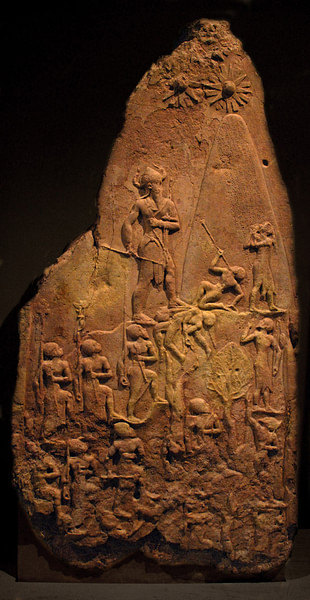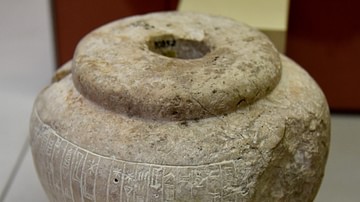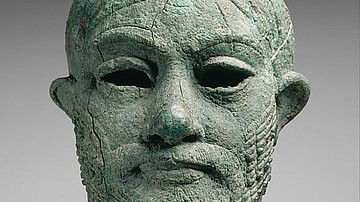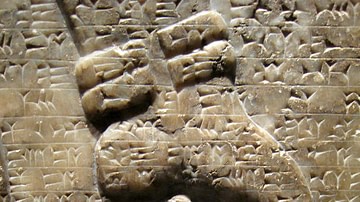The Legend of Cutha (also known as the Cutha Legend and Kutha Legend) is a fictional work dated to the 2nd millennium BCE belonging to the genre known as Mesopotamian Naru literature. It features the Akkadian king Naram-Sin (r. 2261-2224 BCE) in a story illustrating a monarch's proper relationship with the gods and the importance of written records.
The legend is a fictional account of an invasion of Akkadian lands by a superhuman army associated – by their description, not by name – with the Gutians who were held responsible for the fall of the Akkadian Empire c. 2083 BCE. In this account, the army has been raised and nurtured by the gods for their own purposes, and Naram-Sin is explicitly told not to take up arms against them. He defies the gods, however, suffering enormous losses, and is humbled, asks forgiveness, and is brought into a right relationship with the divine will.
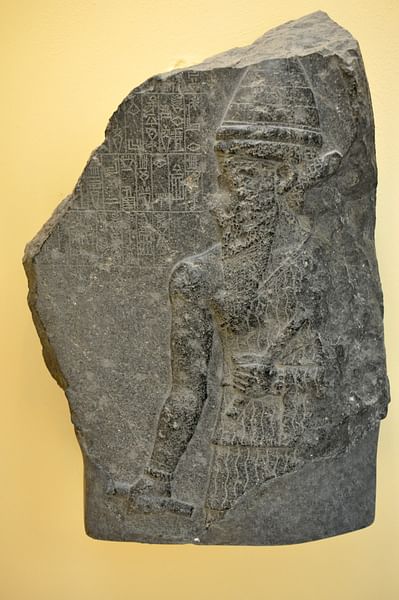
The poem's title comes from the city of Cutha/Kutha (modern-day Tell Ibrahim, Iraq) where Naram-Sin says he left the box with the work in it in a temple to be read by future kings. It has also been known by the titles Naram-Sin and the Enemy Hordes and its first line, "Open the tablet box". Copies of the work have been found in Assyrian, Neo-Assyrian, Old Babylonian, and Neo-Babylonian manuscripts, among others, attesting to its popularity.
Aside from its message of obeying the gods and resisting the temptation to rely on one's own understanding, the poem emphasizes the importance of leaving behind some account of one's life that others may learn from, especially if one is a monarch. The narrative of the events is bookended by Naram-Sin's lament that an earlier king left no such record and his hope that later generations will read and learn from his own. The structure of the piece has earned it the reputation of one of the best, if not the best, examples of Mesopotamian Naru literature, a genre created to entertain, enlighten, and preserve the name of the central character.
Mesopotamian Naru Literature
Mesopotamian Naru literature is also known as 'fictitious autobiography, 'fictional autobiography' and 'pseudo-autobiography' by modern-day scholars as it presents a famous historical figure in a fictional tale, often significantly altering that person's character for dramatic effect. The word naru refers to a stele on which a king would inscribe his great deeds and the genre followed the same formula as these official inscriptions:
- a first-person introduction (who is telling the tale)
- a first-person narration (what happened)
- a blessing or curse on the reader – the blessing was offered to anyone who read, appreciated, and understood the inscription; the curse was directed at those who failed to and disrespected the message
Actual stelae were erected to memorialize a significant event – a military victory, coronation, grand festival, wedding, royal birth, etc. – while Naru literature borrowed the form to impress some moral or cultural value upon an audience. Naru literature did not pretend to be telling the truth about a certain event but to extract meaning from one – or even create a completely fictitious incident – in order to convey some important message, usually having to do with one's proper relationship with the gods.
The most famous examples of this genre, besides the Cutha Legend, are The Legend of Sargon (relating the rise of the first Akkadian king, Sargon the Great, r. 2334-2279 BCE), The Great Revolt, and The Curse of Agade, the latter two also featuring Naram-Sin. Sargon and Naram-Sin were the two most powerful Akkadian kings and were featured frequently in later legends either as heroes or anti-heroes in stories which, usually, had no basis in historical events. The best example of this, though it departs from the Naru literature formula, is The Epic of Gilgamesh (written c. 2150-1400 BCE) which uses Gilgamesh, historical king of Uruk, in a fictional tale exploring the meaning of existence.
History & Structure
Unlike The Great Revolt, which is based on an actual rebellion during the reign of Naram-Sin, The Legend of Cutha has no historical basis but does echo a famous event which would have resonated with an ancient Sumerian audience: the Gutian invasion of Akkad. The Gutians were a West Asiatic nomadic people who lived around the Zagros Mountains and engaged in a series of hit-and-run raids on Akkadian communities, finally culminating in a full-scale invasion which, according to ancient Sumerian scribes, toppled the empire c. 2083 BCE.
The superhuman army in the Cutha Legend are never identified as Gutians and, in fact, the Gutian homeland of Gutium is among those destroyed by them, but the description of the army as "non-human" matches with Sumerian texts describing them as "an unbridled people, with human intelligence but with the instincts of dogs and the appearance of monkeys" (Kriwaczek, 129). The Gutians claimed they were the rightful successors of the Sargonid Dynasty and took control of Sumer, holding it from 2218-2047 BCE, in whole or in part, until they were challenged by the king of Uruk, Utu-Hegal (r. 2055-2047 BCE) in 2050 BCE and later driven out by his successors.
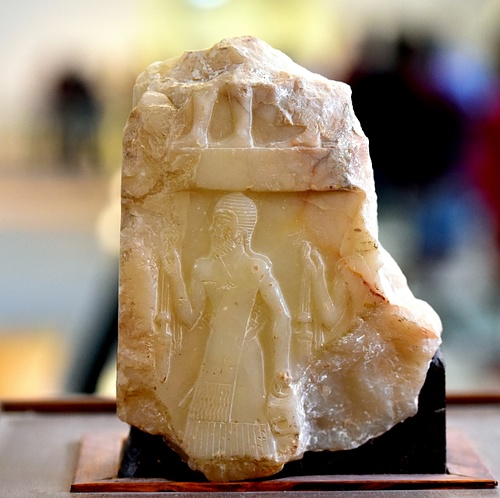
The Cutha Legend follows this historical plot but places the action within a framework emphasizing the importance of relying on the will of the gods – even when their will is unclear or makes no sense – instead of taking matters into one's own hands. The work is structured according to traditional Naru literature formulae but, instead of beginning with the narrator's identity, starts with an admonition to open the stele's box and read Naram-Sin's account.
This introduction, as well as the concluding blessing, makes clear the dual purpose of the narrative: to instruct on a right relationship with the gods and to emphasize the importance of written accounts. The piece begins with Naram-Sin lamenting how an earlier king, Enmerkar, was punished by the god Shamash and "disappeared" leaving no record behind of how he had offended the gods for later generations to learn from.
The story moves on from here to the narrative in which Naram-Sin angers the gods by refusing to listen to them and attacking the invaders, resulting in the deaths of over 200,000 of his men, and how he learns his lesson afterwards. After he has humbled himself and promises to obey the gods, he captures 12 of the superhuman enemy and, instead of killing them as he would like, turns them over to the temple of the god Enlil to face divine justice. The poem ends with Naram-Sin's plea to future monarchs to leave an account of their reign behind and then concludes with a blessing on all who receive and understand his story.
Text of The Legend of Cutha
The following text comes from the translation by scholars Benjamin Studevent-Hickman and Christopher Morgan from their work Old Akkadian Period Texts, pp. 36-40 reprinted in The Ancient Near East: Historical Sources in Translation, edited by Mark W. Chavalas. According to Studevent-Hickman and Morgan, it is a composite text that draws on seven Neo-Assyrian manuscripts and one Neo-Babylonian fragment. Some repetitious lines have been omitted and ellipses indicate missing lines or words. Line numbers are indicated at the left.
Open the tablet box and read the stele
That I, Naram-Sin, a descendant of Sargon
Inscribed and left behind for perpetuity.
The King of Uruk disappeared.
(5) Enmerkar disappeared.Enmerkar, King of Uruk, ruler of the land.
[Some period of time] passed by.
[Some period of time] went by.
Ishtar changed her decision.
(10)…and he rode.[Enmerkar consulted the great gods
Ishtar, Llaba, Sabada, Annunitum
Shullat, Hanish, Shamash the hero.
He summoned the diviners and gave orders.(15) They sacrificed the lambs, seven lambs, seven lambs for seven diviners
He set up the holy reed altars.
The diviners spoke thus:
…
… face.
(20) and like…Upon the earth…may your corpse lie flat.
The great gods had not yet finished speaking!
Enmerkar…Shamash brought a severe judgment.
His judgment, the decision that he made, was that his ghost, the ghosts…
(25) The ghosts of his family, the ghosts of his descendants,The ghosts of his descendants' descendants –
This was decreed by Shamash the hero,
The lord above and below, the lord of the Anunnaki, the lord of ghosts –
That they should drink contaminated water and not drink pure water.
The one whose wisdom and weapons bound, defeated, and killed those troops
Did not write on a stele, he did not leave one behind for me and
(30) he did not make a name for himself and I did not pray for him.A people with partridge bodies, raven-faced humans,
The great gods created them.
On the earth that the gods created was their city.
Tiamat suckled them.
(35) Their maternal goddess, Belet-ili, beautified them.On the midst of the mountains they grew, they reached manhood,
They acquired their proper size.
Seven kings, brothers, renowned for beauty,
Their troops numbered 360,000.
Anubanini, the king, was their father, Their mother was queen Metili.(40) Their eldest brother was their leader – Memanduh was his name.
Their second brother – Medudu was his name.
Their third brother – Tapish was his name.
Their fourth brother – Tartadada was his name.
Their fifth brother – Baladahdah was his name.
(45) Their sixth brother – Ahundanadih was his name.Their seventh brother – Hurrakidu was his name.
They rode in the shining mountains and
The soldier seized them but they struck their thighs.
At the beginning of their approach, they advanced against Purushanda.
(50) Purushanda was wholly scattered.Phulu was wholly scattered.
Puranshu was wholly scattered.
Indeed…
The powers of Umman-manda are struck down, the camps of Shubat-Enlil,
(55) And in the midst of Subartu, all of them wandered about.They scattered those in the seas and they approached Gutium.
They scattered Gutium, and they approached the land of Elam.
They scattered Elam and they reached the plains.
They killed those at the crossing and cast them into
(60) Dilmun, Makkan, Meluhla, in the midst of the sea, as many as they were, they killed.Seventeen kings, with 90,000 of their troops
With them they had come to their aid.
I summoned a soldier and gave him orders.
I handed over a dagger and a pin.
(65) "Attack with the dagger, prick with the pin.If blood comes out, they are human like us.
If blood does not come out, they are spirits, fiends from the underworld,
Demons, lurking ghosts, the work of Enlil."
The soldier delivered his report:
(70) "I attacked with the dagger,I pricked with the pin, and blood came out."
I summoned the diviners and gave orders.
I sacrificed seven lambs for the seven diviners
I set up the holy reed altars.
(75) I inquired of the great gods –Ishtar, Llaba, Zababa, Annunitum,
Shullat, Hanish, Shamash the hero.
The key of the great gods did not permit me to go
Nor did a divine communication in my dream.
Thus I said to myself, thus indeed I spoke:
(80) "What lion practiced divination?What wolf inquired of an interpreter of dreams?
Let me go like a bandit, following the counsel of my own heart.
Let me disregard the counsel of the god; let me take responsibility for myself."
At the arrival of the first year
(85) I sent out 120,000 troops and not one from among them returned alive.At the arrival of the second year,
I sent out 90,000 troops, and not one from among them returned alive.
At the arrival of the third year, I sent out 60,700 troops,
And not one from among them returned alive.
I was disturbed, perplexed, anxious, distressed, and dejected.
Thus I said to myself, thus indeed I spoke:
(90) "What have I left behind as the legacy of my reign?I am a king who has not looked after his land,
And a shepherd who has not looked after his people.
How can I keep proceeding? How can I save my country?
Dread of lions, death, fate, famine
(95) dismay, chills, losses, hunger,Starvation, insomnia – every sort of calamity descended upon them.
Above, in the assembly, the flood was devised.
Below, on the earth, the flood came.
Ea, Lord of the deep, opened his mouth, and said,
(100) speaking to the gods, his brothers,'Oh great gods, what have you done?
You spoke and I unleashed a flood
And to bring about that which you…'"
At the arrival of the New Year festival in the fourth year
(105) with earnest prayer that Ea of the great gods [would hear]I offered the holy New Year's sacrifices.
I sought the holy omens.
I summoned the diviners and gave orders.
I sacrificed seven lambs for the seven diviners.
(110) I set up the holy reed altars.I inquired of the great gods…
(120) Twelve soldiers from among them fled from me.I pursued after them, I hastened, I went faster.
As for those soldiers, I overtook them.
As for those soldiers, I brought them back.
Thus I said to myself, thus indeed I spoke:
(125) "Without divination, I will not inflict punishments."I sacrificed a lamb concerning them.
The key of the great gods said, "Spare Them."
Shining Venus thus approached me from heaven,
"To Naram-Sin, descendant of Sargon:
(130) Cease! You shall not destroy the accursed people!In the future, Enlil will raise them up for evil.
They await the furious heart of Enlil.
The city of those soldiers will be demolished.
They will burn and besiege the dwelling places.
(135) The city will pour out their blood.The earth will reduce its store, the date palm its yield.
The city of those soldiers will die.
City will fight against city, household against household,
Father against son, brother against brother,
(140) Young man against young man, friend against companion.They will not speak truthfully with one another.
People will be taught falsehood and…
They will kill that enemy city.
As for that city, an enemy will seize it.
(145) For one mina of silver, a person will receive a sheath of barley."There was no mighty king in the land
I brought them to the great gods as tribute.
I did not bring them for my hand to kill.
Whoever you are, a governor, or a prince, or any other,
(150) Whom the gods shall call to carry out the office of kingship:I made you a tablet box, I inscribed for you a stele.
In Kutha, in the Emeslam temple,
In the shrine of Nergal I left it behind for you.
Read this stele,
(155) And heed the message of this stele!Do not be disturbed; do not be perplexed.
Do not fear; do not tremble.
Let your foundations be firm!
As for you, do your work in the embrace of your wife.
(160) Fortify your walls.Fill your moats with water.
Your chests, your grain, your silver, your possessions, your goods,
Gather into your fruitful city.
Bind your weapons together and lean them against the corners.
(165) Curb your boldness, look out for yourself!Should he wander throughout your land, do not go out to him.
Should he loose the livestock, do not approach him.
Should he consume the flesh of your soldiers,
Should he kill them and return…
(170) You maintain self-control, you keep yourself in check.Answer them thus: "My Lord.
For their wickedness, return good.
For their good, return gifts and more."
Do not approach them.
(175) Let wise scribesRead your stele.
You who have read my stele,
You who have saved your country.
You who have blessed me, may a future king
(180) Bless you.
Conclusion
Mesopotamian Naru literature, as noted, departed radically from a king's official inscription in that it often depicted a well-known monarch in unflattering light. This formula is apparent in both The Legend of Cutha and, more so, in The Curse of Agade, but both served the same purpose in preserving the name of the monarch for future generations in a more personal fashion than an official inscription on a stele. Scholar Gerdien Jonker explains:
What mattered in the naru literature was the retaining of memory, condensed into the enduring name of the "sender" [the narrator]…Names had to resound because people wished for them to be invoked after death. (96)
It did not matter that the historical Naram-Sin never actually battled a superhuman army and was defeated; what mattered was name recognition and what that famous name meant. In using Naram-Sin as the central character, the message was clarified in that, if a great king could make such a terrible error in judgment, anyone could, and an audience should learn from his mistake. Naram-Sin therefore lived on, not just as a famous warrior king but also as an exemplar of proper relations with the gods and responsible stewardship in leaving behind an account of his experience.
The central purpose of Mesopotamian Naru literature was to teach while entertaining and provide people with a model of behavior they could apply to their own lives. In the Cutha Legend, the great Naram-Sin humbles himself before the gods and is redeemed after a tragic – and costly – mistake and those who heard the story would have understood that they, too, could find forgiveness, no matter how great their sin, and be welcomed back into a right relationship with the gods.
